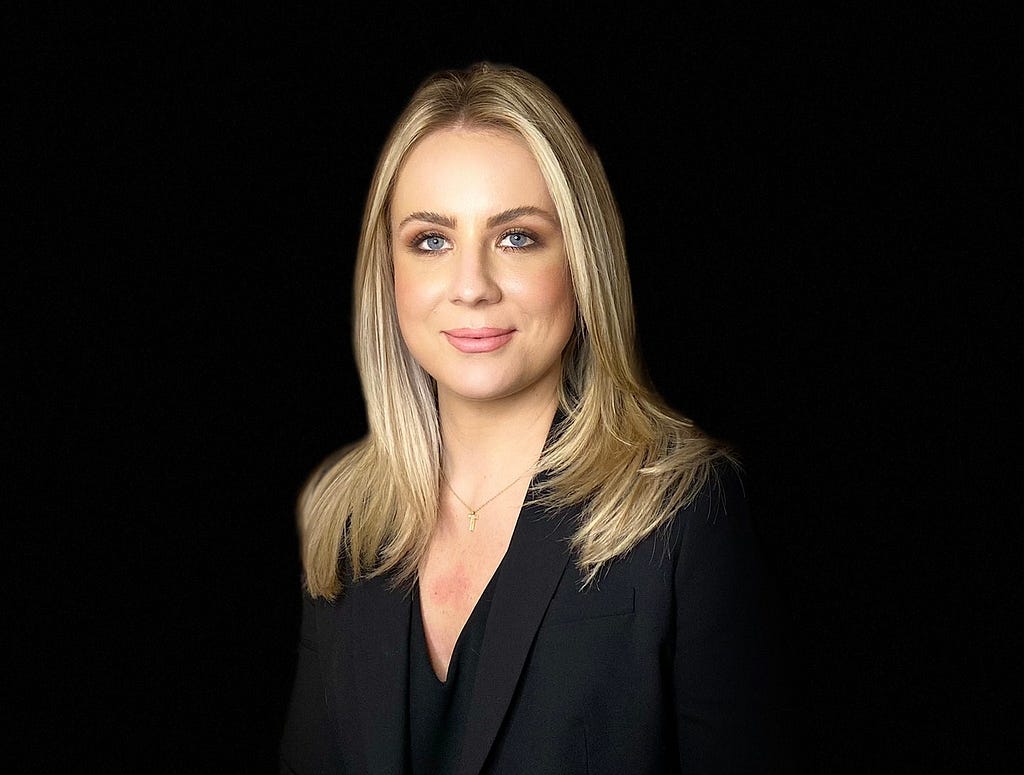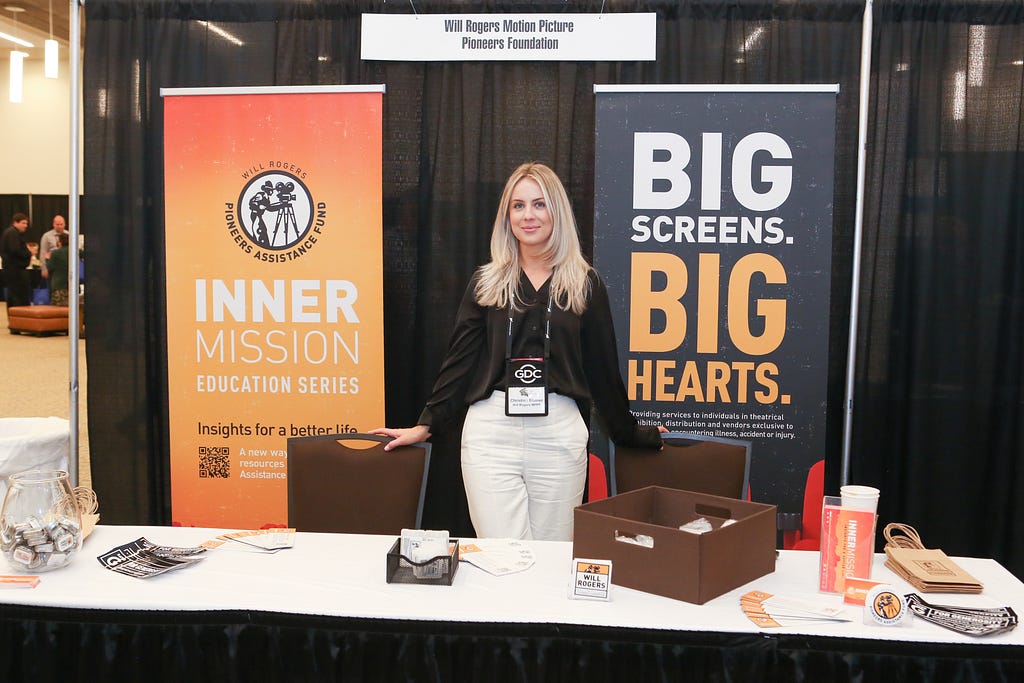Christina Blumer of Will Rogers Motion Picture Pioneers Foundation: 5 Things You Need To Know To Successfully Lead A Nonprofit Organization

Make Sure Someone isn’t Already Doing it: There are more than 1.5 million nonprofit organizations in the U.S. Chances are, there is an organization already working to solve your specific problem. Consider working together with another organization before deciding to start your own.
As part of my series about “individuals and organizations making an important social impact”,, I had the pleasure of interviewing Christina Blumer
Christina Blumer is the Executive Director of the Will Rogers Motion Picture Pioneers Foundation. Named after one of the greatest humanitarians, philanthropists and entertainers — Will Rogers — the Foundation is one of the most beloved and impactful charities supported by the motion picture industry.
Thank you so much for doing this with us. Before we begin our readers would like to get to know you a bit more. Can you tell us a bit about your “backstory”?
Thank you very much for having me. Absolutely. I was born and raised in Los Angeles, California. I attended California State University Long Beach where I received a bachelor’s degree in Human Development in 2009. I have a younger sister, who is seven years my junior, who taught me a lot about responsibility and leading by example. I am an enthusiastic dog-lover and enjoy frequent weekend getaways in Lake Arrowhead, California with my parents, extended family, and friends.
Can you tell us the story behind why you decided to start or join your non nonprofit?
Truth be told, I had no plans to enter the nonprofit sector in a professional capacity. As a young person I never really understood that working for a nonprofit was a career path option. At times in our development years, we are presented with areas of interest and possible lines of work. Unless you are exposed to someone who works in the nonprofit sector, it likely isn’t presented as an option in the way that options like becoming a doctor, a lawyer, a teacher, a mechanic, an architect, a musician, etc are presented.
I was led to the Will Rogers organization as part of a class curriculum during my final year in college. At the time, my mother worked for a major motion picture studio and her boss was on the board of directors and convinced the Executive Director at the time to let me intern for a few months. With practically zero knowledge of the nonprofit sector and the business practices that went along with it, I went into the internship with an open mind and a list of questions. I remember coming to the realization that a person could earn a living AND make a difference in the lives of people who need help all at the same time and my entire perspective on the future changed in the matter of a few months.
Suffice it to say, the internship went incredibly well. I was offered a full-time job (my first ever) and started shortly after graduation.
Can you describe how you or your organization aims to make a significant social impact?
We aim to make a significant social impact in two different ways:
- By directly serving members of the motion picture industry who are experiencing an accident, illness, or injury on an individual basis.
- By providing educational resources to larger groups of film industry members to not only provide them with helpful information about topics like mental health and financial literacy, but to also create a sense of community and healing together as a group.
Without saying any names, can you share a story about an individual who was helped by your idea so far?
We have been in existence for more than 80 years and have helped tens of thousands of individuals throughout our history. To narrow that down to a single story about one individual would be next to impossible. With that said, I can tell you that the outcomes have been so rewarding to see. From the theater employee who had very little knowledge about budgeting skills and basic money management, who eventually was able to purchase her first home, to the lighting technician who couldn’t afford his cancer medication and is now in full remission and was able to return to work, to the studio employee who experienced severe damage to her home during the wildfires who was able to make repairs and bring her family back into their longtime home. The impact of the Will Rogers organization is as real as the individuals we serve.
Are there three things the community/society/politicians can do to help you address the root of the problem you are trying to solve?
- Have Compassion: For some people, asking for help or admitting there is a problem is often a larger issue than the problem itself. When an individual feels as though they are going to be judged or blamed for the unfortunate circumstance they are in, they are having compassion and empathy for people around us, it creates a safe environment for individuals to ask for help or admit there is a problem.
- Harness the Power of Community: The tagline to our assistance program is “taking care of our own”, which is an homage to our roots as a social club back in New York in the late 1930’s. One of the most unique aspects about working in this sector of the film industry is the duty and responsibility we all possess to take care of each other. This is one of the few industries I have encountered where corporate conventions take on the atmosphere of a family reunion. With the changing landscape of this industry and the evolution we are experiencing, I am concerned that the community as a whole is in jeopardy. We are stronger together than we are apart, and my hope is that the members of our industry community don’t lose sight of how fortunate we are to have each other.
- Continue to Focus On Mental Health: There has been a tremendous amount of success in this country in the effort to erase the stigma often associated with mental health. Many companies have incorporated mental health resources into their employee benefits programs and the conversation surrounding mental health has never been more prominent. As a society we have made massive progress. Will Rogers’ Pioneers Assistance Fund supports mental health awareness by normalizing the dialogue surrounding the topic and creating educational resources that are relatable and accessible to everyone. The movement is far from over, and there is still a great deal of work to be done, but I remain optimistic that people who are suffering will get the help they need and the conversation surrounding mental health will be as common as talking about a broken wrist or a sprained ankle.
How do you define “Leadership”? Can you explain what you mean or give an example?
Early on in my career, I tended to force my opinions and my ideas onto other people. I was led to believe (especially as a woman working towards a position of leadership) that the only way to get people to see your point of view was to be firm and unrelenting. So, the harder anyone objected to my point of view, the harder I pushed. One day my predecessor (who was grooming me for the next stage in my career without me even realizing it) said to me, “leadership is not about pushing people down a road and forcing them from behind, rather it’s about going down the road yourself and convincing them to follow you by leading from the front. People are much more willing to see a different perspective if they are brought along rather than forced.” Don’t get me wrong. Occasionally, I will dig my heels in, but I’ve learned that leadership really is about influencing behavior rather than demanding it.

Based on your experience, what are the “5 things a person should know before they decide to start a non profit”. Please share a story or example for each.
- Make Sure Someone isn’t Already Doing it: There are more than 1.5 million nonprofit organizations in the U.S. Chances are, there is an organization already working to solve your specific problem. Consider working together with another organization before deciding to start your own.
- It’s More than Bake Sales and Beach Clean Up Days: In my personal experience, people unfamiliar with the nonprofit sector tend to grossly underestimate the business acumen required to run a successful nonprofit.
- Satisfaction with the Work Needs to Come First: Most of us who choose to work in the nonprofit sector do so because we have a desire to make a difference. On the days that are difficult or the months where we become frustrated with board members or donors, we remind ourselves that at the end of the day we are making a difference in the lives of people who need it most. Sometimes, that in and of itself must be enough.
- Develop a Strong Board: One of the cornerstones of a successful nonprofit is an engaged and passionate board. Identify candidates to become members of the Board of Directors and be specific about expectations and obligations to your organization. Ideally, these individuals bring a wealth of counsel, guidance, and experience to the population you are aiming to serve. They should be committed and passionate about the cause and willing to contribute in a meaningful way to advance the organization’s growth and mission.
- Fundraising is Not for the Faint of Heart: A clear and concise fundraising strategy and plan of execution is imperative. Make it easy for people to give — whether they are donating money or time. Develop short-term and long-term goals. Determine what success will look like to your organization and build a system by which to measure whether you are meeting the benchmarks you created. Be specific about ways in which your organization creates impact and share outcomes with your donors and supporters.
We are very blessed that very prominent leaders read this column. Is there a person in the world who you would like to talk to, to share the idea behind your non profit? He or she might just see this, especially if we tag them. 🙂
It would be a dream come true to sit across the table from music industry icon, Chris Stapleton. For me personally, music is my escape. It’s my mental health support and my release. A well-crafted lyric has the ability to bring you to tears, to bring you immense joy, or to convey a feeling that the spoken word alone cannot express. Chris’ gift for songwriting and music production is as profound as his humility. He was once described as a “once-in-a-lifetime talent”, and I could not agree more. And who knows, maybe our meeting would inspire a song that might help us raise awareness for the people we serve or even help us raise funds to continue our mission of taking care of film industry members who need us most.
Can you share your favorite “Life Lesson” Quote? How is that relevant to you in your life?
Given his aptitude for quotable sayings, I would be remiss if I did not call attention to our namesake himself, Will Rogers. I have grown fond of many of Will’s quotes throughout my more than a decade here, but one quote in particular has been guiding me the last several months, so much so that I framed it and hung it on the wall in my office — “Do the best you can, and don’t take life too serious.” ~ Will Rogers
As a product of the early 90’s education model of standardized tests and the pressure to get all the answers right, I grew up with an intense pressure to not take any risks and the notion that there is always a right answer and a wrong answer. Once I spent enough time in a professional setting, I realized that often there is more than one right answer, and even if you get the wrong answer, chances are nothing terrible is going to happen.
All we can expect from ourselves and the people around us is that we do our best and give ourselves permission to not take life too seriously. We only have one life. A little grace and compassion will go a long way.
How can our readers follow you online?
You can find us on Instagram at @wrpioneers or on Facebook at Facebook.com/wrpioneers.
This was very meaningful, thank you so much. We wish you only continued success in your mission.
Christina Blumer of Will Rogers Motion Picture Pioneers Foundation: 5 Things You Need To Know To… was originally published in Authority Magazine on Medium, where people are continuing the conversation by highlighting and responding to this story.
